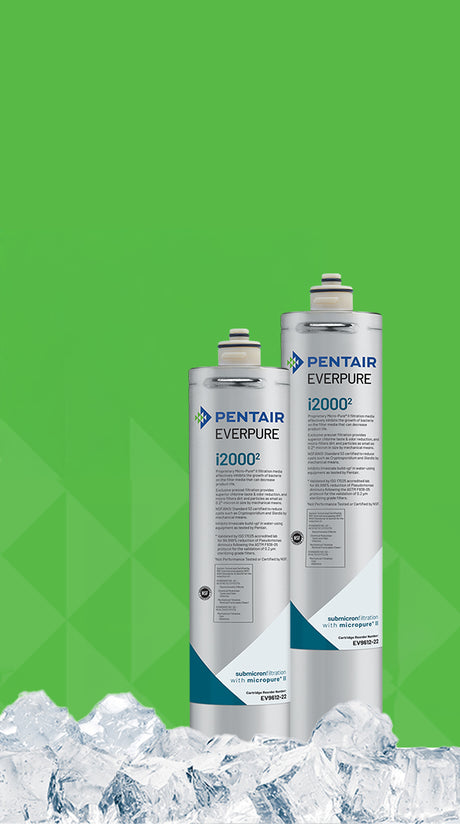Ceramic Candle Filters & Elements
- Regular price $59.00 Unit priceUnit price /UnavailableVery low stock
Part #: W9512600
- Regular price From $30.13 Unit priceUnit price /Unavailable
Part #: MT661/RFC
Save up to 5% with bulk pricing - Regular price $35.00 Unit priceUnit price /Unavailable
Part #: W9512624
- Regular price $39.00 Unit priceUnit price /Unavailable
Part #: W9512500
- Regular price $49.00 Unit priceUnit price /UnavailableBackordered
Part #: W9512630
- Regular price $79.00 Unit priceUnit price /UnavailableBackordered
Part #: W9522650
- Regular price $35.00 Unit priceUnit price /UnavailableVery low stock
Part #: W9512622
- Regular price $29.00 Unit priceUnit price /UnavailableVery low stock
Part #: W9512524
- Regular price $29.00 Unit priceUnit price /UnavailableLow stock
Part #: W9520700
- Regular price $24.29 Unit priceUnit price /UnavailableLow stock
Part #: W9520302
-

15% OFF
Everpure i2000 Insurice Filter Cartridge
Discount Applied in Cart!
- Regular price $13.99 Unit priceUnit price /Unavailable
Part #: W9512521
- Regular price $29.72 Unit priceUnit price /UnavailableVery low stock
Part #: W9512330
- Regular price $35.00 Unit priceUnit price /UnavailableBackordered
Part #: W9512626
- Regular price $19.35 Unit priceUnit price /UnavailableSold out
Part #: W9120562
- Regular price $115.98 Unit priceUnit price /UnavailableSold out
Part #: W9381000
- Regular price $39.00 Unit priceUnit price /UnavailableLow stock
Part #: W9512510
- Regular price From $39.00 Unit priceUnit price /UnavailableSold out
Part #: W9512505
Save up to 5% with bulk pricing - Regular price $44.15 Unit priceUnit price /UnavailableSold out
Part #: W9223022
- Regular price $59.80 Unit priceUnit price /UnavailableSold out
Part #: FC-RIO
- Regular price $34.99 Unit priceUnit price /UnavailableSold out
Part #: DUC-1000
- Regular price $42.35 Unit priceUnit price /UnavailableSold out
Part #: W9220406
- Regular price $24.95 Unit priceUnit price /UnavailableLow stock
Part #: W9512520
- Regular price From $57.23 Unit priceUnit price /Unavailable
Part #: W9223021
Save up to 4% with bulk pricing - Regular price From $59.00 Unit priceUnit price /UnavailableSold out
Part #: W9512550
-

MOST ORDERS OVER $89
FREE SHIPPING
- Regular price $22.45 Unit priceUnit price /UnavailableSold out
Part #: W9220402
- Regular price $25.98 Unit priceUnit price /UnavailableSold out
Part #: W9511250
- Regular price $25.08 Unit priceUnit price /UnavailableSold out
Part #: W9121709
Want to learn more?
What is a ceramic filter?
Ceramic filters eliminate sediment and 99% of bacteria, such as E. coli, shigella, and salmonella, from drinking water. Microbial cysts like Giardia and Cryptosporidium are also caught by ceramic filters’ pores. Some ceramic filters are impregnated with activated carbon, allowing them to further eliminate foul tastes and odors, chlorine, and VOCs from water. A mechanical form of water filtration, ceramic filters offer a cheap, practical, and reliable solution to keeping your drinking water clean. Ceramic filters can be cleaned and therefore have long life cycles, requiring fewer filter replacements than other filtration systems.
How does a ceramic filter work?
Ceramic filters contain pores one-half micron in diameter that catch particles while water passes through. Since most bacteria is larger than one-half micron in size, ceramic filters effectively protect your water from contamination by waterborne pathogens and living organisms. The complex interior of the filter forces contaminants to repeatedly pass through this micron shield, preventing straggling bacteria or sediment from inhabiting the final product. Some ceramic filters contain silver ions that prevent trapped bacteria from multiplying on the ceramic’s exterior. Some also contain an adsorbing carbon core that further protects drinking water from impurities. An additional layer of protection in some filters involves ion exchange resin. These filters prevent metals like lead, mercury, copper, and zinc from contaminating drinking water.
What do ceramic filters remove?
The number of impurities removed depends on the quality of filter.
- Ceramic filters without a carbon core effectively remove living organisms, sediment, and turbidity from drinking water. These filters keep drinking water safe from bacteria, dirt, and suspended particles.
- Ceramic candle filters with a carbon core protect from the same elements but also add an additional layer of adsorption. Carbon cores effectively remove chlorine, a chemical present in most city water. Ceramic filters with a carbon core keep drinking water smelling and tasting fresh.
- Ceramic filters with a carbon core and ion exchange resin additionally protect from heavy metals. These filters are ideal for water from wells or other sources that contain high concentrations of lead, mercury, copper, or zinc. Heavy metals can be damaging to internal organs if consumed in high enough quantities and should be filtered out when possible.
What do ceramic filters not remove?
- Viruses are typically smaller than ceramic filter pores and therefore are not filtered out. UV water purifiers are more effective against viruses than ceramic filters.
- Minerals, such as the magnesium and calcium present in hard water, are not removed with ceramic filters. If you wish to remove minerals from water, water softeners are the perfect product for you. On the other hand, ceramic filters are beneficial if you desire the health benefits from minerals in your water.
- Total dissolved solids are also not eliminated by ceramic filters. In high concentrations, dissolved solids can cause harm, but most tap water does not contain high enough concentrations to be dangerous. However, if you have a need for eliminating dissolved solids from your water, filters that utilize reverse osmosis are your best bet.
Where can I use ceramic filters?
Ceramic filters are typically point-of-use filters, meaning they are connected to a single faucet or water source. They are popular solutions for kitchen sinks and in portable applications like hiking or camping. Ceramic filters can be attached to your faucet underneath your sink, on your countertop, or in a separate gravity-fed container. The portability of ceramic filters is ideal for camping, hiking, or general outdoor use. Certain ceramic filters can even turn creek or river water into a drinkable product.
How do I maintain ceramic filters?
Ceramic filters without a carbon core can be washed repeatedly. When washing, use only water and a plastic brush. Soaps, detergents, and rough cloths can ruin your ceramic filter. Filters without a carbon core can be used until water no longer passes through them.
Ceramic candle filters with a carbon core must be replaced when the carbon core is exhausted. While the ceramic exterior can be cleaned several times before the carbon core is no longer effective, these filters have a shorter life cycle than those without a carbon core.
Why ceramic filters?
Ceramic filters are one of the cheapest and most practical filters on the market because they can be cleaned repeatedly before needing to be replaced. Filters with a carbon core must be replaced when the carbon core exceeds its life cycle. However, those without a carbon core can be washed and reinserted until water will no longer flow through the filter.
If turning tap water into a tastier, better-smelling product is your goal, ceramic filters are a perfect fit for you. Knowing what contaminants reside in your tap water can help you decide how many layers of protection you will want in a ceramic filter.
How are ceramic filters different from other filter types?
Ceramic filters differ from other types based on what is filtered from the water.
- Ceramic filters are excellent at filtering out small bacteria that resides in water. Algae, E. coli, and salmonella are all removed by ceramic filtration. Lager particles such as dirt and other sediment are also taken care of by ceramic filters. These filters are significantly cheaper than UV and reverse osmosis filters.
- Ceramic filters do not filter out bacteria. If bacteria is your primary concern, you need ultraviolet purification (UV). UV filters also protect against bacteria. Since UV filters use ultraviolet light instead of small pores, they remove smaller bacteria than ceramic filters can. UV filters are extremely effective at killing and stopping the reproduction of viruses but do not remove sediment. They cost significantly more than ceramic filters and can be slightly cheaper than reverse osmosis filters.
- If high concentrations of total dissolved solids are present in your water, ceramic filtration does not suit your needs. Rather, you will need a reverse osmosis system. Reverse osmosis filters protect primarily from solids that have dissolved in water. Unlike ceramic and UV filters, reverse osmosis filters are not effective at eliminating organic material, though they accomplish this through proper pre-filtration. These filters are generally the most expensive of the three, but some reverse osmosis options are much less expensive than others.




















![Doulton RIO 2000 Replacement Ceramic Water Filter Candle [6 pack]](http://www.freshwatersystems.com/cdn/shop/files/wq2igerbndenbzsvpeiy.jpg?v=1772531998&width=460)








